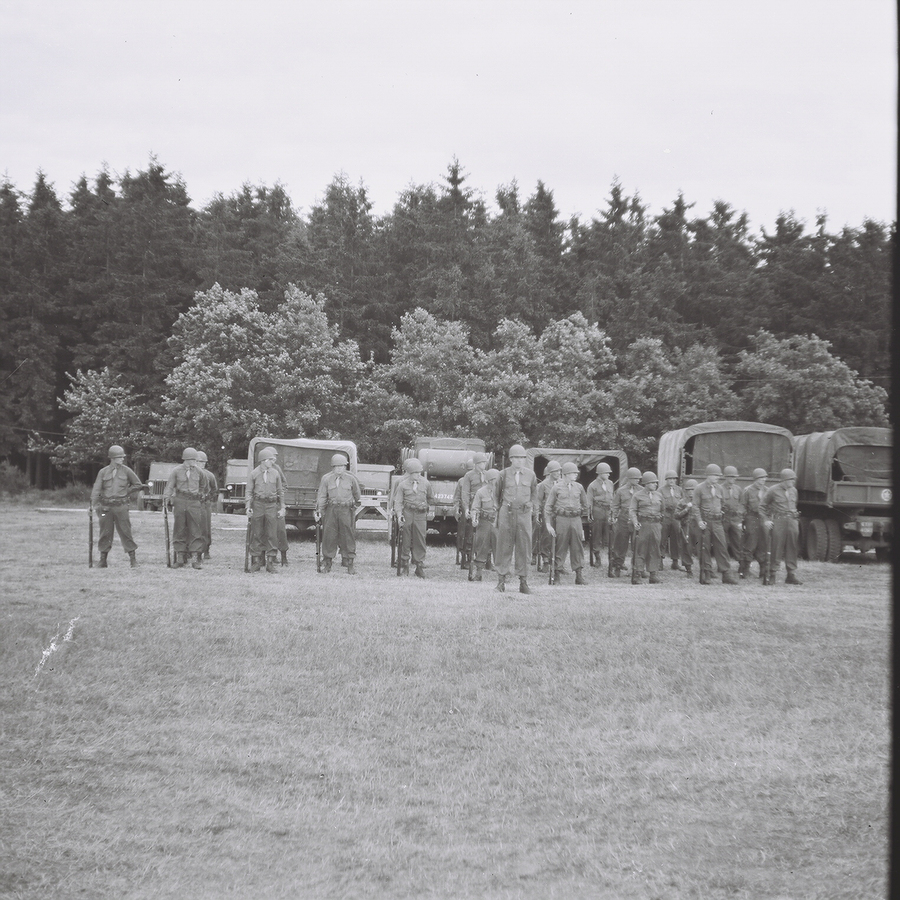Mine School

Likely taken at Walton Hall. From the collection of Irving Mayer.
At Mandeville, the morning was devoted to orientation, study of the little French blue book and conditioning hikes. The afternoons were gainfully employed in reducing the Signal Co. Special to bankruptcy on the soft ball diamond. The men of the third platoon were truly sorry when the backers of the Signal Co. ran out of cash.
In the evening, those who did not practice their newly acquired tongue on their neighbors kept their hand in practice with a light game of blackjack. One evening, the demorum of these proud players was rudely shattered when a mortally wounded Messerschmidt strafed the area with a last dying burst. The dexterity with which the participants scooped up their francs and all piled into the same prone shelter, attested to their fine conditioning.
With one their [sic] of its strength engaging the enemy on the continent, the business of preparing for battle went on as usual for the main body of the 406th Engineers still at Walton Hall. Work on the rubber items finished, the guards were removed and the mornings and afternoons were filled with various training classes.
As a result of examinations given in the classes, a round robin of lectures were given on the work that the men were weak in. Officers end non-coms were selected to lecture on a particular subject. The company rotated around each lecturer, a squad at a time, until each squad had listened to every speaker.
Specialized lectures were found to be particularly effective; the soldiers learned more and enjoyed the talks. Daytime training was augmented by a couple of night combat problems. These consisted of patrol work and night installations of demolitions. The problems lasted all night and the following mornings were free periods.
After the first series of lectures had been concluded, it was announced that an E.M. would have to answer a question or two, on the subjects recently covered, whenever he applied for a pass. The C.O. felt that this procedure would keep the knowledge fresh in the men’s minds end prompt those who were deficient to do a little studying on their own.
Three nights had gone by with nary a pass being applied for, when the Company Commander had the outfit assemble. He, then, told his troops that his policies as a C.O. involved two considerations. The first was to serve his country to the best of his ability by thoroughly training his men. The second consideration was for the men and their families, i.e., to return as many as possible back to civilian life unharmed. The simple oral examinations prior to the issuing of a pass was part of the training and not a punishment.
That evening the company passed a night compass test to the complete satisfaction of the C.O. The next evening the status quo ante bellum was restored and the pass patrols sallied forth.
An aftermath of the company’s mine school was the window shattering performance conducted by 1st/Sgt. Toth. When the mine and booby trap courses were finished, it was necessary to dispose of all the old foreign mines and demolitions that were not fit for military use. The good sgt. And his assistant removed the explosives to a safe area and proceeded to blow them up. However, the charges were so large that windows in Walton Hall and the nearby village of Wellesborne were broken. Calls came into the 23d Hq. asking if a buzz bomb had fallen in its vicinity and the airport at Wellesborne sent two planes aloft to search for the disturbance.
The first harbinger of departure was the order to water proof the trucks. The work was begun on June 26 and finished a week later. During this time, issues of green goggles, gas equipment and fresh first aid packets were distributed to the men.
July 4th was celebrated by the bustling of a T/5 for taxing a bit of femininity about the countryside in his jeep.